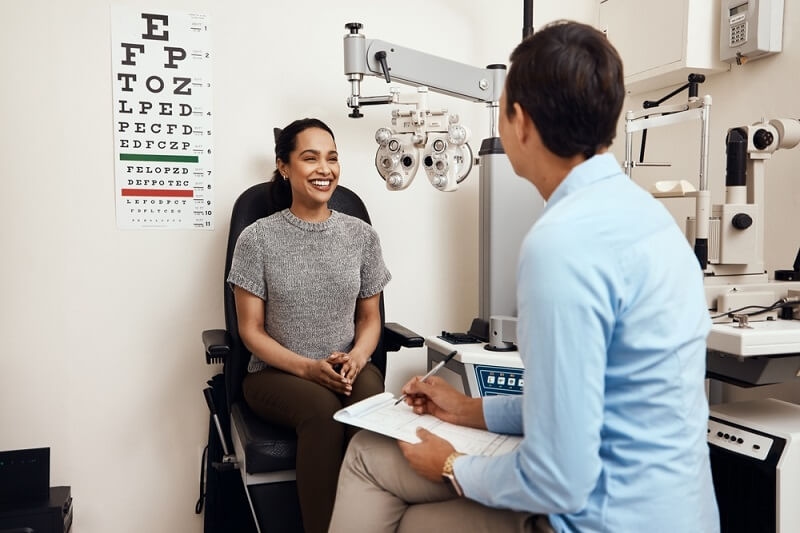
Vision insurance helps people take care of their eyes through regular eye checkups and preventive care. It provides various things that can help you in different ways to make sure that your vision remains clear in the long-term. This insurance policy helps you to stay on top of your eye health seamlessly.
In this blog, you will learn everything about this policy and find out its benefits.
Vision insurance is made to help with the cost of eye care services that are needed regularly. It includes various things like eye exams, glasses, and much more. It even sometimes provides the insurance holder with extra care that can them to improve your eyesight.
This type of insurance is different from health insurance. While health insurance looks after bigger or sudden medical issues, eye health insurance focuses on the smaller but more regular part—checking and maintaining the eyes. It is like a reminder to not forget about your eyesight while handling everything else in life.
Must Read: What is Catastrophic Health Insurance and its Benefits?
The importance of eyes in our everyday life cannot be explained in words. However, there are many who take this for granted, until and unless they suffer from vision related issues. Vision care insurance coverage helps in maintaining healthy eyes by ensuring regular exams and preventive screenings.
Eye exams are more than just reading letters on a board. They help detect small changes in vision early. They also help in identifying signs of other health conditions that may show up in the eyes. Vision care insurance plans encourage people to have these checkups without delay.
Having coverage helps people build a routine around eye health. It keeps eye care from being something that gets postponed until it’s too late. It becomes part of regular health care—just like visiting the dentist or going for a yearly physical.
Having an insurance policy for your eye can help you in various ways and you can find them in the following points:

This insurance plan provides you the opportunity to schedule regular eye exams to make sure that there are no issues in your vision. It helps you to find out the early signs that can damage your eyes in the future.
Most eye sight insurance plans include benefits for glasses, frames, or contact lenses. It makes sure people can get what they need to see clearly.
Routine exams can detect small vision issues before they become serious. It helps prevent strain or discomfort that can build up over time.
There are different types of vision care insurance plans available. Some suit individuals, while others are made for families. It allows people to choose what works best.
When eye care becomes part of a routine, it builds good habits. People start seeing the value of regular vision checks.
Vision care insurance coverage usually includes several important parts. This is generally what is covered by vision care insurance policies:
Most plans include full eye exams that test vision and look for early signs of eye issues.
Many plans include coverage for glasses, including frames and lenses. This ensures people can update their eyewear when needed.
For those who wear contact lenses, vision care insurance often includes fittings and follow-ups to make sure they fit comfortably.
Plans may include basic screenings for common conditions like glaucoma. These tests help detect problems early.
Vision care insurance plans give people access to qualified eye specialists who guide them through their eye care needs.
Top Pick: Applying for Health Insurance EU: Start Your Coverage Now
Guardian vision insurance programs focus on helping people take regular care of their eyesight. These programs are made to connect people with professional eye care providers. They make it easy to get routine checkups done without much delay.
Even though program names can differ, the purpose stays the same. It’s about making preventive care a part of everyday life. People often forget to schedule eye exams, but programs like these encourage them to stay on track.
With regular checkups, it becomes easier to spot changes early and manage vision health before problems grow. It’s a way to stay ahead when it comes to eye care.
Before choosing a vision care insurance plan, it helps to think about a few things. Each plan is different, so reviewing these can make the choice easier:
Look at what the plan covers. It could include exams, lenses, or other eye care services. Knowing this helps in planning regular visits.
It is important to have access to eye care providers nearby. A good network makes visits simple and consistent.
Understand how often you can have checkups or get new lenses under the plan. This helps you to plan your next steps properly.
This plan usually involves simple processes to make appointments or submit claims that makes it extremely easy for people to manage it.
Regular eye care can make your life comfortable and simple. However, to understand the benefits of routine eye care you should check the following list:
Regular eye tests can help doctors identify the early signs of issues that can potentially affect your eyes or the body. This allows you to prevent various forms of serious health issues.
Regular visits help notice vision changes early. That makes it easier to get new prescriptions or care on time.
The right glasses or lenses reduce strain and make reading or working more comfortable.
Keeping up with exams helps prevent common issues like headaches from poor vision.
This is insurance policy is not just limited to aged people. It can be equally beneficial for children as well as young adults because eye health is essential for every human.
Vision insurance is not just a normal insurance plan because it reminds people that it is essential to take care of their eyes. It offers you preventive care in the form of regular checkups to identify small changes that can have a big impact on your eye health in the long-term.
This content was created by AI